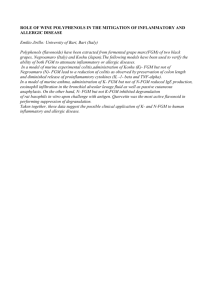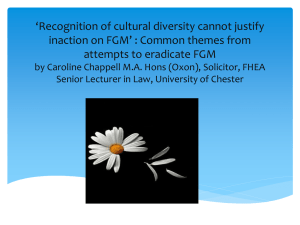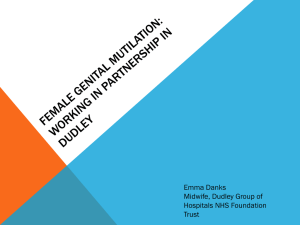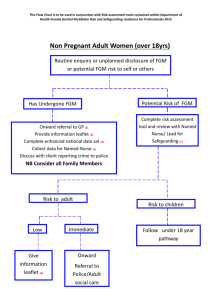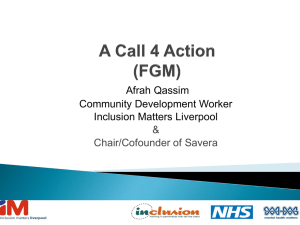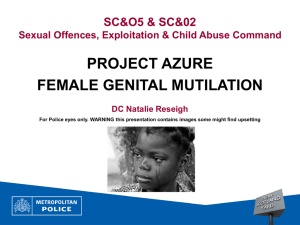Practice Note FGM mandatory reporting October 2015
advertisement
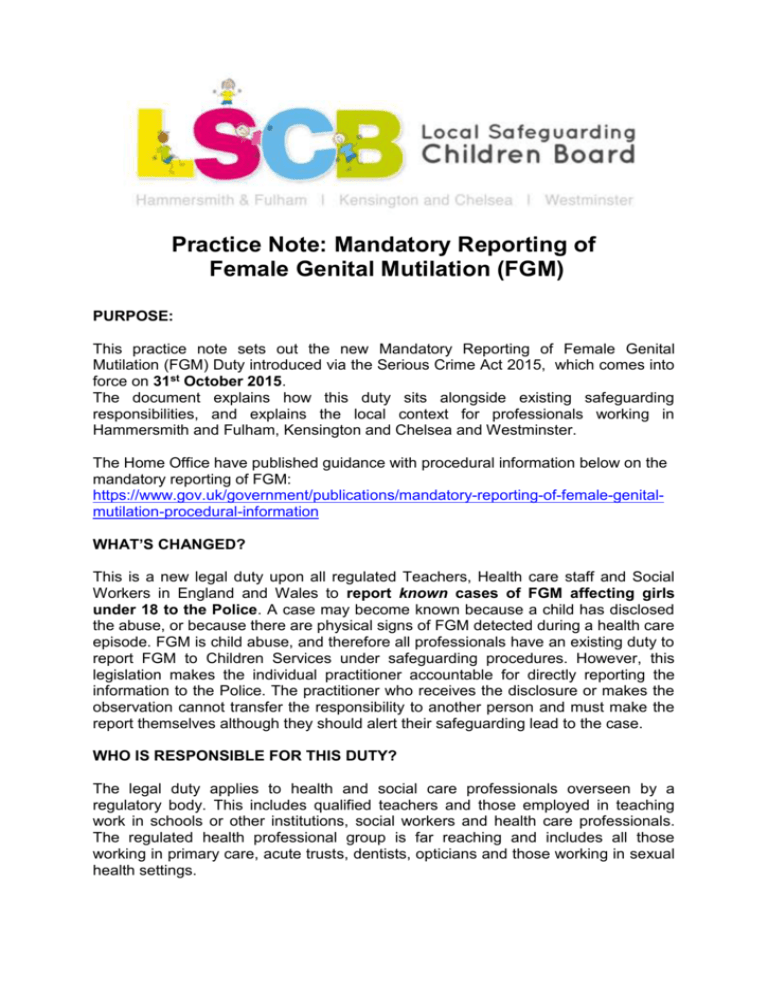
Practice Note: Mandatory Reporting of Female Genital Mutilation (FGM) PURPOSE: This practice note sets out the new Mandatory Reporting of Female Genital Mutilation (FGM) Duty introduced via the Serious Crime Act 2015, which comes into force on 31st October 2015. The document explains how this duty sits alongside existing safeguarding responsibilities, and explains the local context for professionals working in Hammersmith and Fulham, Kensington and Chelsea and Westminster. The Home Office have published guidance with procedural information below on the mandatory reporting of FGM: https://www.gov.uk/government/publications/mandatory-reporting-of-female-genitalmutilation-procedural-information WHAT’S CHANGED? This is a new legal duty upon all regulated Teachers, Health care staff and Social Workers in England and Wales to report known cases of FGM affecting girls under 18 to the Police. A case may become known because a child has disclosed the abuse, or because there are physical signs of FGM detected during a health care episode. FGM is child abuse, and therefore all professionals have an existing duty to report FGM to Children Services under safeguarding procedures. However, this legislation makes the individual practitioner accountable for directly reporting the information to the Police. The practitioner who receives the disclosure or makes the observation cannot transfer the responsibility to another person and must make the report themselves although they should alert their safeguarding lead to the case. WHO IS RESPONSIBLE FOR THIS DUTY? The legal duty applies to health and social care professionals overseen by a regulatory body. This includes qualified teachers and those employed in teaching work in schools or other institutions, social workers and health care professionals. The regulated health professional group is far reaching and includes all those working in primary care, acute trusts, dentists, opticians and those working in sexual health settings. All other professionals and volunteers working with children should be aware that although they are not included in this legislation, they still have a duty to report cases of FGM to Children’s Services. TIMEFRAME: Best practice is that the report should be made by the end of the next working day. The guidance allows professionals up to one month in order to comply with the legislation, if an immediate report is considered to place the child at risk. In this case you must consult with your designated safeguarding lead, and seek advice from Children’s services. Professionals should keep in mind that the consequence of delaying a report is that other girls in the family network could be left at risk of being cut too. Therefore it is strongly advised that advice is sought from Children’s services before the decision to delay a report. Specialist advice can be obtained from Shruti Clayton who is the lead practitioner for FGM cases in Hammersmith and Fulham, Kensington and Chelsea and Westminster. Schools can also seek advice from Hilary Shaw, Safeguarding in Education lead. Each Borough also has Child protection Advisers available in the Safeguarding Team that can assist if Hilary or Shruti are unavailable. HOW TO MAKE A REPORT: Reports of FGM on children are investigated by the Child Abuse Investigation Police Team (CAIT). Social Workers and any other professionals who have established referral routes to CAIT can continue to make FGM referrals via the referrals desk as usual. Other professions are currently advised to make the report by calling 101, the single non-emergency Police number. In the event that you have any difficulty referring via that route, please contact Children’s services who can support you to contact the CAIT team directly. In an emergency situation you are advised to call 999. WHAT HAPPENS NEXT? Following the report, the CAIT team will liaise with Children’s services and background checks will be made through the Multi-agency safeguarding hub (MASH). A multi-agency strategy meeting will be held to consider the case. In most cases there will be a Child Protection Investigation which means that Police and Social Workers will visit the family to assess whether the child is safe, whether there is a risk to any other children in the family, and whether there are grounds for criminal proceedings. The Social Worker will also be assessing what support the family needs, and working with the family to help ensure that the girl and her mother receives the psychological and physical health care required to address the life-long health conditions that are associated with FGM such as chronic pain, blood borne viruses and traumatic flash backs PHYSICAL EXAMINATIONS: If signs of FGM are detected during a health examination the Health professional is not required to further examine or diagnose what type of FGM has taken place – simply to report it. In the three boroughs, we now have a pilot specialist clinic for girls affected by FGM based at Queen Charlotte’s Hospital. Girls receive a holistic and sensitive joint examination from a Consultant Paediatrician and Consultant Gynaecologist. They receive preparation and support at clinic from a specialist social worker, child psychologist and Health Advocate drawn from an FGM practising community. We understand how distressing physical examinations are for girls affected by FGM and their families, and we have developed this new service to meet their needs. WHAT IS THE CONSEQUENCE OF NOT REPORTING? The consequence for the professional is that they will be held accountable by their regulatory body, and could face an investigation into their professional competence. The consequence for the child is that the harm she has suffered will remain hidden, she will not receive the specialist help she needs to prevent health problems developing, and other girls in the family may be left at risk. WHAT IF A RISK OF FGM IS SUSPECTED? The duty to report directly to the Police does not apply to cases of FGM in women over 18, or cases where there is a risk but no disclosure from the child or physical indication. However, cases where a risk of harm due to FGM is suspected should always be referred to Children services in line with existing safeguarding procedure. FGM is a traditional practices and the presence of FGM in a mother who has female children is the clearest indicator of potential future risk to other girls in the family. Often a mother who has been cut may be against the practice, but the power to make the decision about cutting her daughters may rest with the father or elder relatives in the family. Therefore, the level of risk cannot be assessed by one agency through talking to the mother alone. Like all safeguarding concerns this information should be shared with Children’s services so that a joint assessment of the family situation can be considered. It can be really difficult to decide whether to make a referral or not in FGM cases; if in doubt always consult your safeguarding lead, and Shruti Clayton, Hilary Shaw or your local Children’s Services Team who can offer advice on guidance on whether you should make a referral in the circumstances. KEY CONTACTS: Shruti Clayton – Shared Services FGM Lead Practitioner – TEL: 0207 641 1610 Hilary Shaw – Safeguarding in Education Lead – TEL: 0781 736 5519 Debbie Raymond – Joint Head of Safeguarding – TEL: 0773 931 5970 FURTHER INFORMATION: For further information on FGM, please refer to the professionals page on the Local Safeguarding Children Board Website: www.rbkc.gov.uk/lscb. Author: Debbie Raymond – Joint Head of Safeguarding Oct 2015
